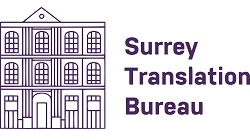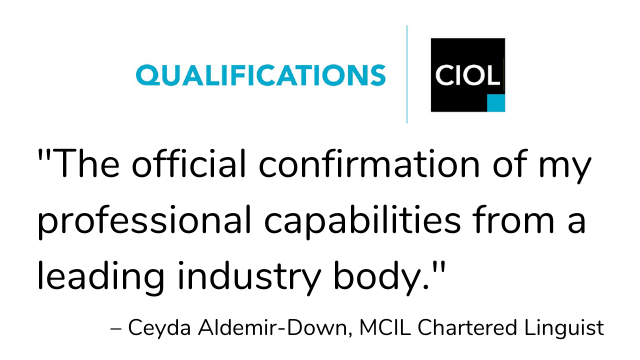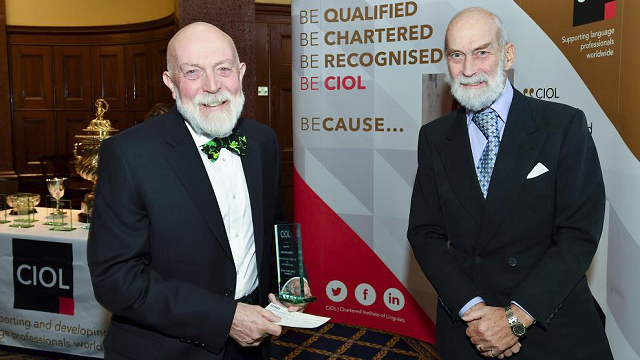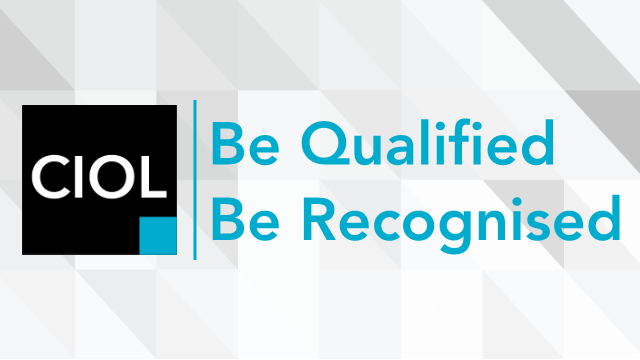-
QUALIFICATIONS
- For Linguists Worldwide
- For UK Public Services
- Preparation
- Policies & Regulation
-
MEMBERSHIP
- Join CIOL
- Professional Membership
- Affiliate Membership
- Chartered Linguist
- Already a member?
- Professional conduct
- Business & Corporate Partners
-
LANGUAGE ASSESSMENTS
- English
- All Other Languages
-
CPD & EVENTS
- Webinars & Events
- CIOL Conferences
- Networks
- CIOL Mentoring
-
NEWS & VOICES
- News & Voices
- CIOL eNews
- CIOL Awards
- The Linguist Magazine
- Jobs & Ads
-
RESOURCES
- For Translators & Interpreters
- For Universities & Students
- Standards & Norms
- CIOL & AI
- All Party Parliamentary Group
- In the UK
- UK Public Services
- Find-a-Linguist
Why the DipTrans qualification stands out to a translation agency
By Allison Spangler, former Head of Resource Management at Surrey Translation Bureau
 As Head of Resource Management at Surrey Translation Bureau, I always have an inbox full of CVs. I make sure to vet them carefully, but with so many to view, I normally scan for a few key points before diving into the details. The points I look for straightaway include things like language combinations (many CVs omit language combinations all together!), number of years’ experience, proof of experience in the translation industry (if you are a student or just starting out, try pro-bono work or getting stuck in to some webinars to show you’re keen to learn), specialisms and CAT tools (yes, most of the work we do requires them although there can be exceptions).
As Head of Resource Management at Surrey Translation Bureau, I always have an inbox full of CVs. I make sure to vet them carefully, but with so many to view, I normally scan for a few key points before diving into the details. The points I look for straightaway include things like language combinations (many CVs omit language combinations all together!), number of years’ experience, proof of experience in the translation industry (if you are a student or just starting out, try pro-bono work or getting stuck in to some webinars to show you’re keen to learn), specialisms and CAT tools (yes, most of the work we do requires them although there can be exceptions).
All of these details are really important to include on a CV, but as an ISO 17100:2015 certified translation agency we are looking for skilled linguists with a translation qualification, meaning an MA in Translation Studies, or the DipTrans qualification that is offered by the Chartered Institute of Linguists (CIOL).
The DipTrans from CIOL stands out because it is an internationally recognised certification that proves a translator has the linguistic skills required to perform as a professional translator. The testing is rigorous and notoriously difficult, as I have heard from chartered linguists themselves, and assesses skills like comprehension, accuracy, grammar and register. Any translation agency would expect translators to have honed these skills prior to registration, so passing the DipTrans exam is certified proof of your linguistic skills.
However, the qualification represents more than just your linguistic skills. It also shows that you place high importance on the quality of your work. Becoming a member of a professional organisation such as the CIOL means that you are dedicated to the profession and prepared to invest in your craft. Many translators will study a specialism throughout their career; CIOL has exams available in specialised subjects such as technology, business, science, literature, law or social sciences. Having passed an exam in one of these specialisms means that an agency or end client will have confidence in your skills in these areas straightaway.*
It can do wonders for your brand as it shows clients outwardly (add those letters after your name in your signature!) that you are a professional, qualified linguist. Even more importantly, having the backing of a professional organisation can also give linguists confidence in their own skills. As a translation agency, we rely on linguists to be experts in their field, and to research complex subject matters. Of course project managers can help with queries and liaise with the clients about tricky terminology, but ultimately linguists must have the expertise and skill to make the final call before delivery.
Being a freelance translator has the unfortunate stereotype of being quite a solitary profession, but it doesn’t have to be! Becoming a chartered member will provide you with a community of support which includes training, networking and conferences. This kind of professional network is the gateway to a successful career in the translation industry. The DipTrans is not only a qualification, but an investment that will enable you to advance your career, gain credibility and get noticed by agencies and end clients alike.
*It’s worth noting that as an agency, it is a requirement for certain clients that you take an additional test translation before registering with us.
More
The Chartered Institute of Linguists (CIOL), Incorporated by Royal Charter, Registered in England and Wales Number RC 000808 and the IoL Educational Trust (IoLET), trading as CIOL Qualifications, Company limited by Guarantee, Registered in England and Wales Number 04297497 and Registered Charity Number 1090263. CIOL is a not-for-profit organisation.








